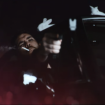In early 2014, James Kurdziel put the first single from U.K. duo Royal Blood into rotation on Buffalo, New York, rock station The Edge, where he serves as program director. That track, "Out of the Black," was instantly reactive. "Immediately the phone calls come in — 'What was that?'" Kurdziel remembers. "What was interesting was: a lot of times when we get those curiosity calls, it's people saying, 'What was that song you played that kind of sounded like Kings of Leon or Smashing Pumpkins?' You didn't get a lot of that with Royal Blood. This was: 'What was that? I don't know what it sounds like, I just know I like it.'"
So it's been for Royal Blood — an English twosome featuring Mike Kerr on bass and vocals and Ben Thatcher on drums — who will touch down stateside this fall in support of their second LP, How Did We Get So Dark?, and play major American venues as the opener for Queens of the Stone Age.
When the duo released their debut album in 2014, they incited the kind of mainstream fervor that has rarely flared for new rock bands in the last decade. The pair quickly racked up populist milestones — Royal Blood went No. 1 in the U.K., and spawned three top five entries on Billboard's Mainstream Rock Songs chart in the U.S. — as well as praise from some of rock's biggest names, new and old: Foo Fighters took them on tour, while Led Zeppelin's Jimmy Page described their output as "music of tremendous quality."
This was a remarkable turn of events for Kerr and Thatcher, who have known each other since the two were teens in South England and have been gigging in a series of going-nowhere-loudly bands for longer than that. Thatcher almost abandoned band life completely — "You'd travel up to Glasgow to play to three people, and they were the bar staff," he lamented in 2015 — but agreed to record with Kerr again after the bassist returned from a sojourn in Australia.
The two write incisive songs, occasionally swiping from the heavy-bore ebb and flow of 1970s blues rock but mostly conjuring a crystalline, brisk, no-frills smack primed for filling arenas with bodies in motion. They love lurching shifts that allow them to move suddenly from chugging and sludgy to vroom-ing and needle-nosed.
Kerr's bass, to everyone's delight, also serves up a guitar sound, pulling double duty as bludgeoning rhythm instrument and a source of squalling leads. "If you get him to play guitar, he just sounds like Jimi Hendrix; if you play it on bass, it sounds like Royal Blood," explains Jolyon Thomas, who co-produced the duo's new album. Few overdubs are added in the studio: Kerr mostly plays songs all the way through on a three-quarter sized bass with two guitar amps, a bass amp and a selection of pedals. "You get a lot more energy out of a smaller thing," Thomas notes, referring to Kerr's choice of instrument.
Add to that Thatcher's drumming: busy, hammering, authoritative. "It isn't all about the bass; there are big beats on there," Thomas says. "Big fills and big drum moments: you know it's coming; you anticipate it; everyone locks in together."
Though listeners took to Royal Blood's music in droves — the duo's first album was the fastest-selling rock debut in the U.K. since Noel Gallagher came out with his High Flying Birds project — Kerr remains modest when assessing his group's impact. The relative scarcity of mainstream rock acts, he reasons, "was working in our favor." "We came along at the right time, certainly in the U.K., as something new and exciting," he continues. "That has happened at different points in the past and will happen at different points in the future."
The band was catapulted into the whirlwind that boosts buzzy acts, touring furiously for two and a half years behind just ten tracks. "They're songs that we love, but we debuted a new one at Reading Festival in 2015 ["Hook, Line and Sinker"] and we were beyond happy to be playing something new," says Kerr. "We weren't ever expecting things to happen so quickly and so fast," he adds.
This set up Royal Blood, like many groups before it, for a second-album letdown. The routine that created the original batch of ear-perking songs had been destroyed by the churn of the next-big-thing machine. And total life upheaval was compounded by the pressure of people like Jimmy Page predicting "they're going to take rock into a new realm."
Aware of this potential pitfall, the duo moved cautiously when they started making How Did We Get So Dark?, trying sessions in England, Nashville and Los Angeles before hitting the studio in Brussels with approximately 50 song ideas. "It probably took a bit longer than we thought or were planning it to take," says Kerr. "But I think it was all the better for it. We needed a bit of a time out."
They recruited Thomas — who has credits on records by M83 and Daughter, and was assisting U2 with new music in 2015 — to help them make small alterations to their sound on How Did We Get So Dark? "We wanted to progress," Kerr says, but not end up making "a kind of weird reggae record." On multiple songs, he serves as his own backing chorus for the first time, stacking harmonies that add a lighthearted call-and-response element to the jarring riffs.
Originally, Royal Blood brought in backup singers with a background in soul and gospel to handle the harmonies, but according to Kerr, "it wasn't quite right."
"We thought about other singers and other textures," acknowledges Thomas, "but [Royal Blood's] just two guys, and as soon you move it away from that, it loses its character. It's like Mick Jagger and Keith Richards — there's a dynamic there, and they play off each other. If you took Jagger away, Richards would be really rough; if you took Richards away, Jagger would be really annoying. It's the same with them."
The other adjustments Royal Blood make to their sound on How Did We Get So Dark? are more subtle. Occasionally the pair augments their ascetic drum and bass setup with a keyboard — a Fender Rhodes bass, according to Thomas, in keeping with the duo's bass-heavy sound. Two collaborators also helped out with songwriting: John Barrett from Bass Drum of Death is credited on two songs, and Patrik Berger, better known for his high-flying forays in the pop songwriting world (Robyn's "Dancing on My Own," Charli XCX's "Boom Clap"), added to album closer "Sleep."
In sum, these changes all add a bright patina to Royal Blood's whomping, cinderblock-dense core. The contrast between sheen and tooth-shaking sound is made more extreme by Kerr's morose vocals, which often dwell on imploding relationships — including his own, which fell apart following the success of Royal Blood — and their aftermath. The records opens "on a sinking ship with a heavy heart." "How did I become a lookalike of someone you used to love?" Kerr wonders. Little has changed on album closer "Sleep," which finds the singer in a jealous frenzy: "I just can't help myself/ Thinking you're with someone else/ Sick to the bone/ I don't wanna sleep." Kerr is not one for parsing lyrics, though he allows that "Sleep" appears to have struck a nerve: "From the minimal feedback I've seen online, it seems to have resonated with a few people."
Royal Blood have managed to achieve an increasingly rare balance, making heavy rock that is palatable to the mainstream. "There's a lack of riff-based music at modern day alternative radio," explains Ross Mahoney, Program Director for Las Vegas' X107.5 "You either go to the left and play a lot of Foster the People or pop stuff, or you go to the right and play more of the Breaking Benjamin or Three Days Grace stuff. [Royal Blood] walk that line." This puts them in a small group of bands — Mahoney also points to Highly Suspect and Deftones — that bring some weight to today's Alternative Rock airwaves. "It sounds so good cutting through," he adds.
Royal Blood's single "Lights Out" reached 1.4 million listeners through radio last week, according to Nielsen Soundscan. Once again, Kurdziel is seeing that the duo's single is causing The Edge's listeners to break their daily routine, call into the station and beg for more information on the band. "Almost the same thing happened [as it did when they released their first album]: you put the song on, and you get the calls, 'What was that?'" Kurdziel says. "You tell people it's the new Royal Blood. They go, 'Oh! Cool!'"











